|
|
|
Sort Order |
|
|
|
Items / Page
|
|
|
|
|
|
|
| Srl | Item |
| 1 |
ID:
148531
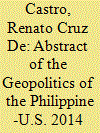

|
|
|
|
|
| Summary/Abstract |
This article examines the geostrategic implications of the 2014 Philippine-U.S. Enhanced Defense Cooperation Agreement (EDCA) in terms of U.S. utilization of the five agreed locations in the Philippines. The Philippines negotiated this pact because of its limited defense capabilities and China`s heavy-handed handling of the 2012 Scarborough Shoal stand-off. The two allies discussed the terms and conditions from September 2013 to March 2014 and signed the agreement in late April 2014. In January 2016, the Philippine Supreme Court ruled in favor of the EDCA setting in motion the deployment of American forces in the Philippines. Currently, the U.S. Air Force (USAF) maintains a small contingent of aircraft and personnel in Philippine territory. This presence in five Philippine Air Force (PAF) bases marks the return of U.S. airpower which can be projected deep into China`s near sea defense zone. Only time will tell if the allies can fully develop a formidable deterrent posture to constrain China`s expansionist moves in the South China Sea.
|
|
|
|
|
|
|
|
|
|
|
|
|
|
|
|
| 2 |
ID:
148532
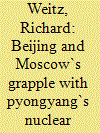

|
|
|
|
|
| Summary/Abstract |
Beijing and Moscow pursue similar goals and policies toward the Democratic People`s Republic of Korea. They want to end North Korea`s nuclear weapons and ballistic missile tests, since these activities spur further proliferation, complicate China`s and Russia`s outreach toward the Republic of Korea, and strengthen the U.S. military presence in Northeast Asia. Yet, Beijing and Moscow oppose military responses or strong sanctions since both parties fear that coercive measures could precipitate regime change in Pyongyang, which alarms them more than a nuclear-armed North Korea. Hence, Beijing and Moscow seek to wean Pyongyang off of its nuclear addiction through foreign assistance and security assurances that promote an international climate favorable toward internal reforms and improvements in North Korea`s external behavior. They argue that dialogue and negotiations leading to the denuclearizing of the Peninsula would best promote the interests of all parties in terms of regional peace and stability. Nonetheless, there are important differences between China`s and Russia`s policies. For example, Beijing has more economic tools to apply against the DPRK, while Moscow seems more open to Korean reunification, under certain conditions, as an enduring solution to the Pyongyang problem.
|
|
|
|
|
|
|
|
|
|
|
|
|
|
|
|
| 3 |
ID:
148534
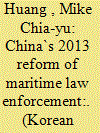

|
|
|
|
|
| Summary/Abstract |
Since late 2012, Chinese President Xi Jinping has introduced far-ranging measures to “build China into a maritime power (建設海洋强國).” One notable campaign was the creation of a centralized China Coast Guard (CCG) force and the National Oceanic Commission (NOC), as the previous lack of a functional mechanism to coordinate China`s maritime policies and five maritime law enforcement agencies, the “five dragons,” has been a longstanding problem hindering the country from effectively administering its maritime territories. This paper argues that the operational functions of the CCG have been developed, although not fully, and CCG vessels are now undertaking patrol missions in an orderly pattern. Nevertheless, at the policymaking level, the progress of the reform is rather limited. Particularly, the development of the NOC, an organ responsible for the “top-level design” of China`s grand maritime strategy, as well as the legal foundations for the CCG`s operations are still incomplete. Moreover, Beijing`s decision not to incorporate the Maritime Safety Administration into the CCG suggests that the country is adopting an old logic of “crossing the river by feeling the stones (摸着石頭過河)” while still pledging to reach its maritime power goal, part of the Chinese dream for national rejuvenation.
|
|
|
|
|
|
|
|
|
|
|
|
|
|
|
|
| 4 |
ID:
148535
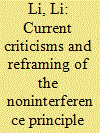

|
|
|
|
|
| Summary/Abstract |
The “Five Principles of Peaceful Coexistence” was born against the background of poverty, powerlessness and humiliation. It became the guiding principle of China`s foreign policy since it was first proposed in 1953. However, several reasons led to increasing criticisms of it, especially regarding the noninterference principle. These reasons include the economic interdependence and blurring of boundaries in a globalized world, the rise of China`s power, and China`s extending overseas interests. The criticisms are reflected in three aspects: whether sovereignty allows for humanitarian intervention against the background of proliferating international human rights norms; whether China`s behavior obeys the noninterference principle; and whether this principle can serve China`s national interests. Chinese scholars respond to these criticisms in terms of three aspects: the noninterference principle should be flexibly interpreted depending on the specific background; many alternate terms of the principle like “creative involvement,” “constructive intervention,” and “participatory advocacy” were put forward; China`s sticking to the fundamental sovereignty principle has never changed. It is sensible and necessary for China to reframe the noninterference principle based on analysis from international, regional and domestic levels. This reframing should protect China`s national interests while matching the image of “responsible great power.”
|
|
|
|
|
|
|
|
|
|
|
|
|
|
|
|
| 5 |
ID:
148533
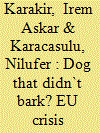

|
|
|
|
|
| Summary/Abstract |
Based on the commonly held assumptions about the inability of the European Union (EU) to cope with new challenges, this paper raises the question of whether the EU will assume greater responsibility for peace, especially in its neighborhood, in the short-term. It contributes to answering this question through focusing on EU mechanisms, instruments and policies of crisis management (civilian-military) since the 1990s, which is embodied in the European Security and Defense Policy (ESDP). In March 2015, the European External Action Service (EEAS) presented a report on CSDP indicating problems in crisis management. Yet, the EU strives for efficient activities. It considered reviewing its neighborhood policy as well as Common Security and Defence Policy (CSDP) to enable more effective actions to deal with crises. Today, it has a huge “toolbox” to address crises. The EU attaches great importance to a coherent and comprehensive strategy in crisis situations. Observing that a comprehensive strategy of the EU was launched in early 2015 to deal with the crisis in Syria, this paper questions to what extent the EU`s new arguments for crisis management are realized in its regional strategy for Syria. While the Syrian crisis is still unfolding, its impacts on the EU in the form of rising terror attacks in Europe by Islamic State in Iraq and Syria (ISIS), and an unprecedented influx of migrants are remarkable.
|
|
|
|
|
|
|
|
|
|
|
|
|
|
|
|
| 6 |
ID:
148536
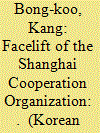

|
|
|
|
|
| Summary/Abstract |
For the past 15 years, the Shanghai Cooperation Organization (SCO) has preserved its non-Western (and sometimes anti-Western) identity and its policy toward the West has been based on a “soft-balancing” strategy. This paper aims to examine the SCO`s identity positioning and understand the implications of its strategy and policy toward the West in terms of three recent global events relating to the SCO. India`s membership effect will be able to soften the SCO`s image of the club of authoritarian states or an anti-Western group as well as to make less-assertive its non-Western identity. China`s economic power projection aiming at the “peaceful rise” is inclined to make the SCO`s identity less anti-Western. Russia`s policy of expanding partners and widening cooperation in greater Eurasia is also likely to weaken not only the rhetoric, but also the substance of the anti-Western narrative. The SCO`s shift of identity positioning, in general, from the non-Western to a less assertive non-Western is likely to soften the SCO`s soft balancing against the West, and the anticipated range and effect of the softer balancing could be greater due to the widened platform and the improved image.
|
|
|
|
|
|
|
|
|
|
|
|
|
|
|
|
| 7 |
ID:
148540


|
|
|
|
|
| Summary/Abstract |
The article investigates the extent to which the European Union has contributed to the enhancement of Poland``s security. It achieves this through the analysis of various instruments of the EU within the Common Foreign and Security Policy in order to determine how (or if) they influenced Poland``s security policy. After the accession to NATO and the EU, Poland could not find its next strategic objective and was gradually losing its position as a leader in the region. Without national interests clearly defined, it is difficult to benefit from the opportunities the EU is presenting to its members, even if these opportunities are limited. The greatest problem is going from one extremum to the other with the shift of power between the two main opposing political parties-Civic Platform and Law and Justice.
|
|
|
|
|
|
|
|
|
|
|
|
|
|
|
|
| 8 |
ID:
148538
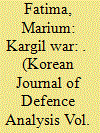

|
|
|
|
|
| Summary/Abstract |
In the winter of 1998-99, the inexplicable presence of Pakistani troops under the pretext of being local freedom fighters in the Indian-administered side of Kashmir brought the region to the brink of a nuclear war. This paper probes the military rationale behind Pakistan`s initiative, organizational interests, internal politicking among different state organs, and the role of a few powerful individuals in the operation. It takes into account the important dimensions of strategy employed during the preparations for the Kargil War and the errors on the part of Pakistani planners which if addressed could have reversed the outcome of the operation. The controversies surrounding the Kargil conflict are discussed through the works of academicians and memoirs of the military commanders from India and Pakistan. The first part of the paper focuses on the rivalry and causes of the outbreak of war between India and Pakistan by explaining the beliefs and psychology of the military planners based on the premise of Cashman and Robinson. The second part reviews the political and nuclear milieu in which the conflict took place, while the third part accounts for the international efforts to prevent the conflict from escalating. The fourth part draws conclusions from the entire episode, indicating the discrepancies on both sides and the evidence that Kargil was unique because it challenged the military logics.
|
|
|
|
|
|
|
|
|
|
|
|
|
|
|
|
| 9 |
ID:
148539


|
|
|
|
|
| Summary/Abstract |
This study explains why defense reform efforts in South Korea have failed to achieve substantial progress. The outcome would seem all the more unexpected because the Blue House has ostensibly wanted comprehensive defense reform, while the Korean military is also highly motivated to upgrade itself to be able to fight and defend itself against North Korea, which has continuously threatened to use nuclear weapons preemptively. How should we account for this puzzle? This study focuses on three factors to explain the absence of reform: the role of the president, the opposition from the armed forces leadership, and lapses in the civilian control of the military. This study concludes that South Korea needs to revitalize the reform process in order to successfully confront the security challenges of the twenty-first century. Defense reform has long been dominated by the military leaders. It has resulted in the unwanted situation where civilian leaders have been alienated. Ironically, lack of interest among civilian leaders leads to the lack of support from outside. In order to achieve successful defense reform, assistance from the outside must be guaranteed. South Korea needs to readjust goals and prepare for building robust armed forces to play a decisive role in achieving the mission to meet the requirements of changing strategic environments. The Park administration also needs to take timely steps to overcome its own vulnerabilities, such as modifying its doctrine, equipment, training, and culture. Elimination of its vulnerabilities may involve changes in philosophy, tactics and possibly even modifications to the concepts of operations. All can entail substantial costs. However, the cost of not dealing with the threats is likely to be much higher.
|
|
|
|
|
|
|
|
|
|
|
|
|
|
|
|
| 10 |
ID:
148537
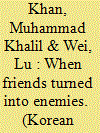

|
|
|
|
|
| Summary/Abstract |
After 9/11, the Pakistani state`s decision to abandon the Taliban (friends) under U.S. pressure and later to become a “frontline” state in the war against terrorism had led to a massive change in the “strategic security paradigm” of the Pakistani security establishment. This strategic policy U-turn transposed the state`s long-held strategic partners and friends (Taliban) into brutal enemies in the war against terrorism in Pakistan. This article critically analyzes the enigmatic situation in which these friendly forces emerged as brutal actors in the war against terrorism and empirically examines the strategies and tactics that Tehrik-i-Taliban Pakistan (TTP), adopted over time to create panic and fear to gain political leverage during military operations against them. This paper also highlights tactical mapping of TTP and its affiliates, its ideological grounding, and critical analysis of the perilous relationship between the state and Taliban forces as the Afghan jihad presents a state of war on terror.
|
|
|
|
|
|
|
|
|
|
|
|
|
|
|
|
|
|
|
|
|